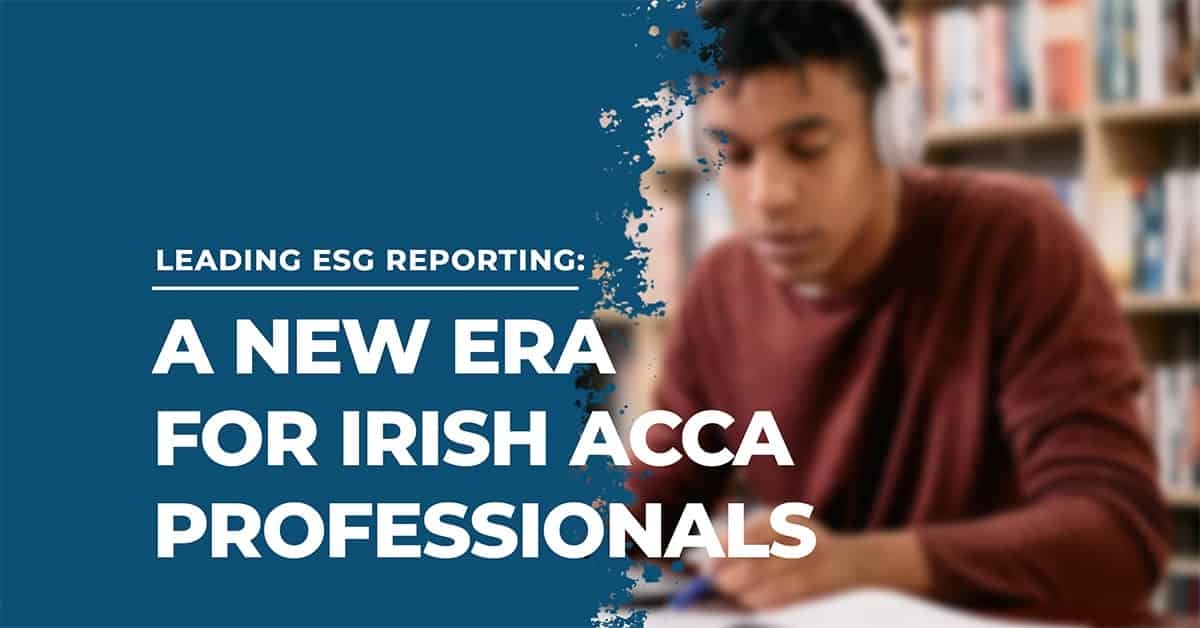The landscape of corporate reporting is undergoing a profound transformation, with Environmental, Social, and Governance (ESG) considerations moving from peripheral concerns to central business imperatives. For ACCA-qualified professionals in Ireland, this evolution presents both significant challenges and exceptional opportunities. As sustainability reporting frameworks mature and regulatory requirements intensify, finance professionals with the right capabilities are uniquely positioned to lead this transformative agenda.
The ESG Reporting Evolution in Ireland
Ireland’s business environment has experienced accelerating momentum toward ESG integration, driven by several converging factors:
Regulatory Developments
The EU’s sustainability reporting landscape has transformed dramatically, with implications for Irish businesses:
- The Corporate Sustainability Reporting Directive (CSRD) significantly expands reporting obligations beyond large listed companies
- The EU Taxonomy for sustainable activities creates new classification requirements
- The Sustainable Finance Disclosure Regulation (SFDR) imposes new transparency obligations on financial market participants
These frameworks create immediate demand for qualified professionals who can navigate complex sustainability reporting requirements.
Investor Expectations
Ireland’s position as a European financial services hub means local professionals are experiencing firsthand the transformation in investor priorities:
- ESG integration into investment analysis has become mainstream rather than niche
- Enhanced scrutiny of sustainability claims to prevent “greenwashing”
- Growing demand for decision-useful sustainability metrics
Business Strategy Integration
Forward-looking Irish businesses increasingly recognize sustainability as strategically fundamental:
- ESG considerations affecting access to capital and financing costs
- Supply chain resilience linked to climate adaptation
- Competitive differentiation through sustainability positioning
The ACCA Advantage in Sustainability Reporting
ACCA-qualified professionals possess several distinct advantages in addressing sustainability reporting challenges:
Technical Foundation
The ACCA qualification provides critical technical capabilities relevant to ESG reporting:
- Strong understanding of reporting frameworks and standards adaptation
- Experience applying professional judgment to measurement uncertainties
- Capability to design and evaluate control environments
- Familiarity with assurance principles and methodologies
Business Integration Perspective
ACCA’s broad based syllabus develops the integrative thinking essential for effective sustainability reporting:
- Understanding of how operational activities connect to financial outcomes
- Ability to translate technical requirements into practical business processes
- Experience communicating complex information to diverse stakeholders
Ethical Framework
The ethical dimensions of ACCA training align powerfully with ESG priorities:
- Professional skepticism when evaluating sustainability claims
- Commitment to transparency and fair presentation
- Independence and objectivity in balancing stakeholder interests
Key Competencies for Irish ACCA Professionals in ESG
To capitalize on ESG opportunities, Irish finance professionals should develop capabilities in several critical areas:
Sustainability Reporting Frameworks
Familiarity with evolving standards and frameworks is essential:
- European Sustainability Reporting Standards (ESRS) under the CSRD
- International Sustainability Standards Board (ISSB) standards
- Task Force on Climate-related Financial Disclosures (TCFD) recommendations
- Global Reporting Initiative (GRI) Standards
Measurement and Metrics
Quantification of sustainability impacts requires specialized approaches:
- Carbon accounting methodologies across different scopes
- Life cycle assessment principles for product impacts
- Natural capital valuation techniques
- Double materiality assessment
Data Management
Sustainability reporting creates significant data challenges that finance professionals are well positioned to address:
- Establishing data governance for non-financial information
- Designing controls for sustainability data collection
- Managing the integration of financial and non-financial data
Assurance Readiness
As sustainability information becomes subject to increasing assurance expectations:
- Understanding assurance standards applicable to sustainability information
- Designing processes that produce assumable data
- Preparing for external assurer engagement
Practical Steps for Irish ACCA Members
For ACCA qualified professionals in Ireland seeking to develop ESG expertise, several practical approaches can accelerate capability development:
Formal Education and Certification
Structured learning provides essential foundation:
- ACCA’s Certificate in Sustainability for Finance
- ESG Certificate programs from recognized providers
- Specialized qualifications in carbon accounting or sustainable finance
Professional Network Engagement
The collective intelligence of professional communities offers valuable insights:
- ACCA Ireland’s sustainability events and working groups
- Sustainable Finance Ireland’s knowledge-sharing activities
- Cross-disciplinary forums bringing together sustainability and finance professionals
Practical Experience Acquisition
Hands-on involvement delivers the most powerful development:
- Volunteering for ESG reporting responsibilities within current roles
- Participating in sustainability working groups or committees
- Contributing to pilot projects for new reporting requirements
Career Opportunities for ESG-Focused ACCA Professionals in Ireland
The intersection of finance expertise and sustainability knowledge creates diverse career pathways in Ireland’s evolving market:
Corporate Reporting Roles
As sustainability reporting becomes integrated with financial disclosures:
- ESG Reporting Manager positions overseeing non-financial disclosure
- Integrated Reporting Specialist roles connecting financial and sustainability narratives
- Sustainability Controller functions establishing appropriate controls and processes
Sustainability Strategy and Advisory
Beyond reporting compliance, strategic advisory opportunities include:
- Sustainability Finance Business Partner roles supporting operational decision-making
- Sustainable Finance Specialists developing green financial products
- Climate Risk Advisors helping organizations understand financial implications of climate change
Assurance and Compliance
The growing demand for credible sustainability information creates opportunities in:
- ESG Assurance roles within accounting firms
- Sustainability Compliance positions ensuring adherence to evolving regulations
- Carbon Accounting Specialist functions focused on emissions measurement
Challenges and Considerations
While opportunities abound, Irish ACCA professionals should recognize several challenges in the sustainability reporting landscape:
Evolving Standards
The sustainability reporting ecosystem remains in flux:
- Multiple frameworks with varying requirements and scopes
- Ongoing standard development creating implementation uncertainty
- Materiality definitions that differ from traditional financial reporting
Cross-Disciplinary Knowledge
Effective sustainability reporting requires breadth beyond traditional finance:
- Scientific understanding of environmental impacts and climate science
- Familiarity with social impact measurement approaches
- Knowledge of sector-specific sustainability challenges and opportunities
Conclusion: Leading the Transformation
For ACCA-qualified professionals in Ireland, the evolution of sustainability reporting represents a significant opportunity to expand influence and create value. By building upon their strong technical foundation with specialized sustainability knowledge, Irish finance professionals can position themselves at the forefront of this transformative business movement.
Beyond career opportunity, this specialization offers something equally valuable the chance to contribute meaningfully to Ireland’s sustainable future. By helping organizations measure, manage, and communicate their environmental and social impacts effectively, finance professionals play a vital role in driving better decision-making and accountability.








